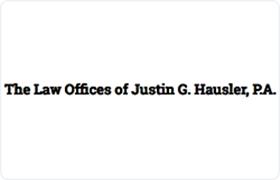Orange City DUI-DWI Lawyer, Florida
Sponsored Law Firm
-
 x
x

Click For More Info:
-
The Law Offices of Justin G. Hausler, P.A.
5570 South US Highway 17-92 Casselberry, FL 32707» view mapCriminal Defense Because Your Case Matters
As a Former Prosecutor, Justin G. Hausler has a wealth of jury trial experience and offers representation regarding all misdemeanor and felony charges.
407-617-1064
Justin G. Hausler
✓ VERIFIEDCriminal, Divorce & Family Law, Accident & Injury, DUI-DWI, Motor Vehicle
Justin G. Hausler has worked in the criminal area of practice since being admitted to the Florida Bar. He began his legal career as a Prosecutor for t... (more)
Benjamin Lee Jones
Family Law, Divorce, DUI-DWI, Criminal
Status: In Good Standing Licensed: 17 Years
Joseph M. DeFranco
Accident & Injury, Estate, Family Law, DUI-DWI
Status: In Good Standing Licensed: 19 Years
Mark H. Randall
Domestic Violence & Neglect, DUI-DWI, Criminal, Licensing
Status: In Good Standing Licensed: 50 Years
Lawrence A. Newman
Dispute Resolution, DUI-DWI, Criminal, Personal Injury
Status: In Good Standing Licensed: 26 Years
Kenneth Alan Barlow
Motor Vehicle, Family Law, DUI-DWI, Criminal
Status: In Good Standing Licensed: 33 Years
Andrew Clifton Moler
Tax, Traffic, Lawsuit & Dispute, DUI-DWI, Criminal
Status: Deceased Licensed: 35 Years
John A Baldwin
Real Estate, Lawsuit & Dispute, Divorce & Family Law, DUI-DWI
Status: In Good Standing Licensed: 55 Years
 Justin Hausler Casselberry, FL
Justin Hausler Casselberry, FL AboutThe Law Offices of Justin G. Hausler, P.A.
AboutThe Law Offices of Justin G. Hausler, P.A. Practice AreasExpertise
Practice AreasExpertise


